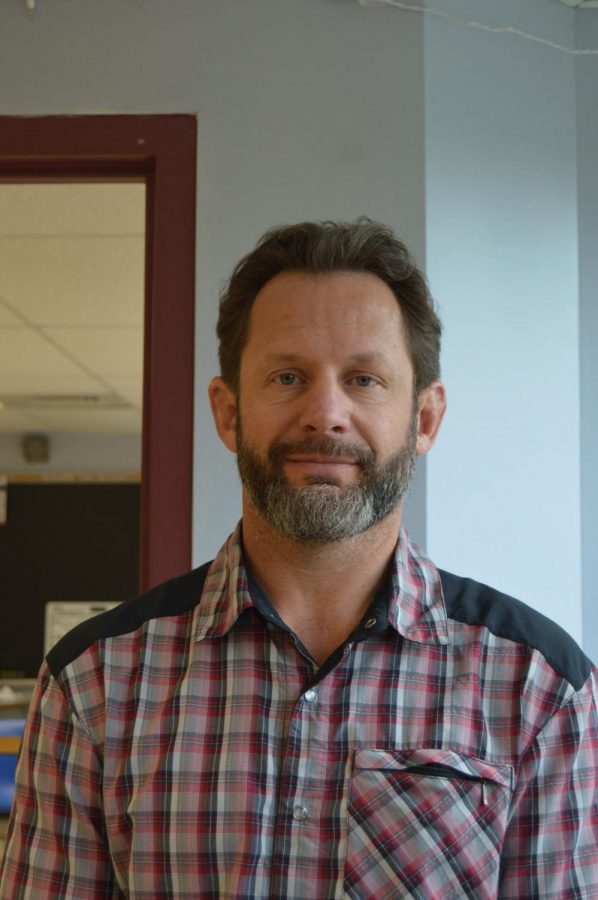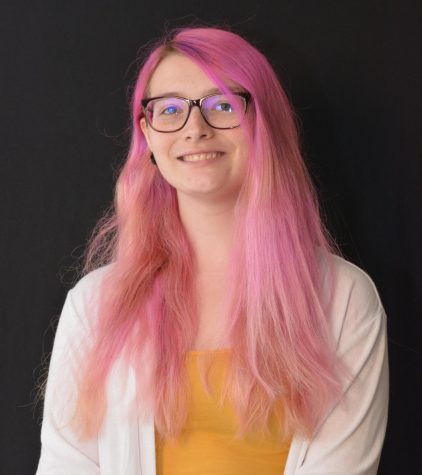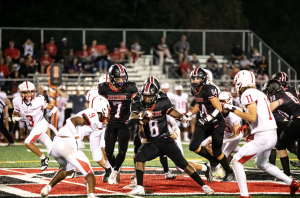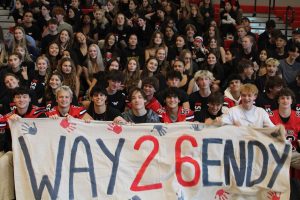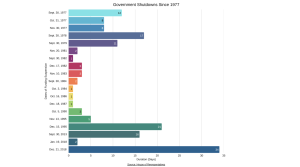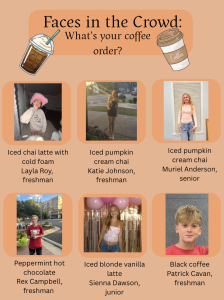Teacher, Coach, Professional Football Player: Jason Perkins
“You can take the boy out of the country, but you can’t take the country out of the boy.”
May 30, 2019
While I waited for my interview with Mr. Perkins, I occupied myself with watching his fish. He has three bettas. My friend Anton was with me at the time, and as he walked around the tanks, the pink one followed him with a curious stare.
Before the students he was working with left, Mr. Perkins asked to see the assignment. He turned to me and said, as a way of explanation, “Have you ever heard of the phrase ‘Trust but verify’?”
“Oh, yeah,” I replied. “You trust they did it, but you make sure they really did.”
“Yeah, yeah. Trust but verify.”
Mr. Perkins checked their work, then sent them on their way.
The first thing I did, after pressing the record button on my phone, was grin and gesture to the fish. “Your kids named them, right?”
He laughed and said yes. Then, he told me their names (Gine, Trumpet, and Mason), and a little about his plans for them.
“We’re trying to mate not only the tilapia, but we’re trying to see if we can get the bettas to mate and make babies, too.”
By ‘we,’ he means the GMHS Science Department and his Environmental Science students.
“ ‘Aquaculture’ is basically raising fish outside of the natural waters. So, indoor. Using a filter, a pump, water – tilapia were just a common fish to raise,” Mr. Perkins said.
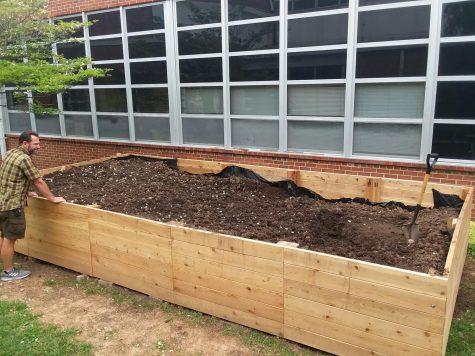
He then listed every job Environmental Science students are given concerning the care of the fish: maintaining the filter, identifying the fishes’ sex, feeding them, managing the pH levels of the water, measuring the amount of nitrates, nitrites, ammonia, and so on.
Operating in tandem with GMHS’s aquaculture is its hydroponics.
You may have passed the Nutrient Film Technique (NFT) system between classes, the SciFi-looking planter set up next to the main office. It’s connected to an advanced method of urban agriculture, in which nutrient-rich water is recirculated over the plants’ roots through a series of tubes. George Mason’s NFT system is being used to grow lettuce.
Mr. Perkins said, “[The Enviro. students who started the project] were selling the lettuce and [we] still are to the cafeteria.”
Like with the tilapia, the lettuce takes quite some work. The students involved are entirely responsible for the system’s maintenance. Additionally, the group of kids that started this project had to build and set up the system themselves.
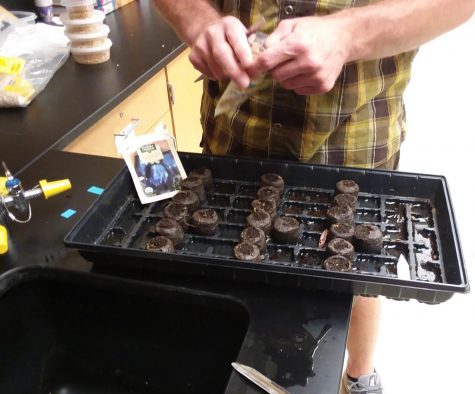
When asked what the end goal of all of this work was, Mr. Perkins answered, “To make fish tacos.”
Raised on his family’s farm, Mr. Perkins had always had an interest in the ‘how’s and ‘why’s of life.
“I grew up with horses, ducks, rabbits, chickens, cows, and loved the outdoors – gravel road, out in the country. And just learned to love science, nature, how things worked.”
Teaching may be Mr. Perkins’ career and passion now, but for part of his youth, he was a professional American football player… in Europe.
“I had some opportunities to try out for the NFL, and for the CFL, and I wasn’t good enough. But, I got to play in the European Football League.”
He played in Aix-en-Provence, a city in southern France, for two years.
Mr. Perkins considered himself “pretty successful” – he started for four years and was a two-time captain, as well as a three-time All-American. Additionally, he was declared the EFL’s Defense Player of the Year.
“I was actually just inducted into the University of Pennsylvania Hall of Fame. Last year, I was inducted into the Aix-en-Provence Argonauts Hall of Fame, which is pretty cool,” he nonchalantly dropped.
His tone was casual as he listed his accomplishments, because, to Mr. Perkins, awards and Halls of Fame weren’t the most important part of the experience. “I did a lot of backpacking, traveling, just going on a train – put my backpack on and just disappear for two or three weeks. Overall, I probably backpacked for at least four months.”
“How many countries would you say you’ve been to?” I leaned forward in my seat.
He tapped his fingers on the desk before him as he thought it through. “Probably in the teens, maybe – I’d have to count, but 15, 17, maybe 20 different countries.”
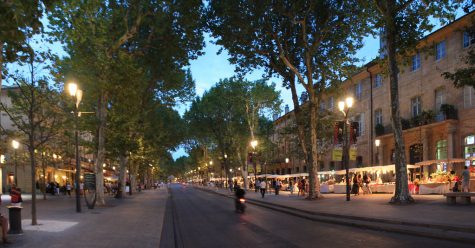
Aix-en-Provence is a city in southern France. Mr. Perkins lived and played here for two years, and the memories he made stick with him to this day. (Photo by Ivan Herman via Flickr)
In regards to his time in Europe, as a whole, Mr. Perkins said, “It was just a lot of fun, a lot of good comraderies, a lot of common goals and aspirations with a bunch of guys. It was just really… tied-in.”
“And it was hard leaving that.”
“Post-football, when I was on my own,” Mr. Perkins continued, “I started my own business. I was, like, a sole proprietor, and I didn’t have a bunch of people to work with. And adjusting to that was not easy, being –”
At this point, my body caught up with my mind, and I cut him off: “Wait, you started a business?”
“Yeah.”
After he decided to leave the professional sports industry, Mr. Perkins started and ran his own distribution company.
“I wanted to get into teaching, but teaching was literally, like, 18 or 20 thousand dollars a year in northeast Ohio. It was really low-paying, and I was just thinking, do I go to Europe? Do I go to Korea to teach? Do I go work on my mom’s farm? What do I want to do?” Mr. Perkins said.
“My dad is a distributor. So he’s like, ‘Hey, you know, instead of making 20 [thousand dollars a year], you can try this, and you can probably go ahead and make 50 or 60 grand in your first year.’ And this was back in 1997.”
“So, I was like, woah, hey, I’ll give that a shot.”
While he lived in Ohio and nurtured his business, Mr. Perkins also worked hard to maintain a long distance relationship with his future wife, who lived in Germany. They met when he was playing in the EFL. Every three months or so, he flew to Europe to visit her, and she visited him in turn.
Then, one phone call changed everything.
“Betina [his wife] was like, ‘Hey, I got a job with Enterprise Rent-A-Car. They’re hiring people who can speak German’ – She speaks German, Portuguese, English, and French,” Mr. Perkins said.
“So, she came back. She wanted to go to Cleveland. We were going to go to Cleveland together, and that didn’t work out. She ended up being stationed here, in Arlington, so I was like, hey, I’ll just sell my business, come over there, and we’ll be together. Happily ever after.”
He continued, “I was able to bring my business. I started working in Washington, D.C. I was serving southern Maryland, mostly. That went on for about seven, eight years.”
In D.C., Mr. Perkins learned of the local music scene and quickly became infatuated.
“So, I started an advertising and promotion company, and started hiring at-risk youth to distribute fliers, pamphlets, stuff like that,” he said. “Go-Go was big; I was doing a lot for Go-Go bands.”
Over the next eight or nine years, Mr. Perkins was also the Executive Producer of the album, played an extra who died in the movie “Divided City”, and put on countless shows.
“And then I was like, you know what? This is kind of getting old. I really wasn’t enjoying the distribution much. I had three employees – So I was like, maybe I’ll go back and get my Master’s. And, before I do that, let me start substitute teaching. So I went and taught in a couple of places, and I was like, yeah, I’ll get back into coaching and teaching.”



